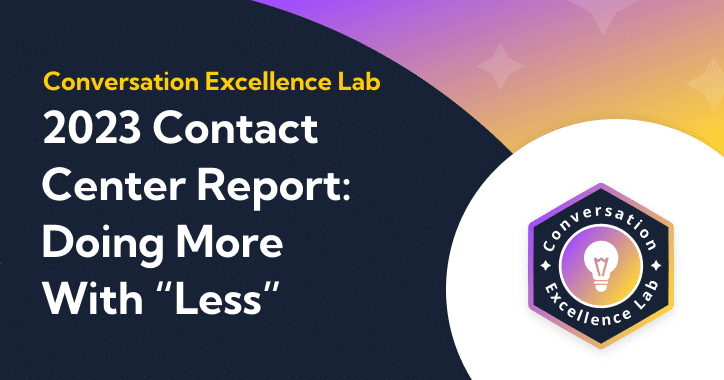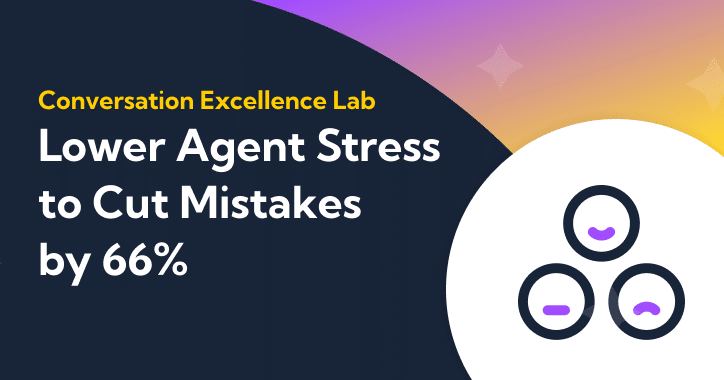“What do you want to be when you grow up?” As a society, we ask this question of children, but not often enough of adults. We surveyed over 2000 contact center agents and were eager to hear their answers to this aspirational question. Here’s what we learned:
- Contact center agents are more likely than the general population to want to work for themselves.
- There are a lot of reasons for this, including the desire for flexible schedules, the perception of limited corporate paths forward for contact center agents, and more.
- Workers who have experienced economic downturns often turn to self-employment for the control it gives them over their work outcomes.
- Companies can not only retain but get improved value from their entrepreneurial-minded employees by increasing benefits and creating opportunities for ‘intrapreneurship’ in their organization.
These findings are part of our series on agent attrition in today’s contact centers. Check out our full report here.
Subscribe to future Conversation Excellence Lab reports below:
What Do You Want to be When You Grow Up?
When asked “What is your dream job, career, or industry?”, most of our respondents described wanting to gain a skill or switch careers (61%). The top three careers or skill sets agents wanted to transition to were medicine (21%), management (6%), and entertainment (6%). Agents’ ambition and diversity of thought came through clearly: every industry from sports to IT, psychology to aerospace, was represented in our responses.
After wanting to gain a skill or switch careers, the second most common answer to “What is your dream job, career, or industry?” was a variation of “I want to work for myself” (14%). Agents described wanting to be freelance photographers, real estate flippers, and even proprietors of island casinos. They want to own record stores, restaurants, and retail establishments. Most importantly, they want to work for themselves.
Some agents’ dreams are specific (“I want to own my own janitorial business and hire people that need a second chance”) while others are general in nature — 57% of respondents who want to work for themselves have a specific vision or industry in mind. For the remaining, the mere fact of working for themselves is a dream within itself (“I just want to be independent, self-employed, and be my own boss.”).
The Demographics of Entrepreneurship
Although it sounds small, 14% is not an insignificant percentage. Of the 150 million workers in the United States, about 16 million — or 10.7% — identify as self-employed, a lower percentage than those who want to be self-employed in the contact center industry.
During the height of the pandemic, this number decreased by 14.2%, while general employment fell by 15.5%, signaling that self-employed individuals fare better in terms of job stability than traditionally employed workers.
Figure 1: % of the U.S. Populations vs. The Contact Center Population that Wants to be Self-Employed
Why would contact center workers be more likely on average to dream of working for themselves? We have a few hypotheses:
- In our survey, the average educational attainment of those who want to work for themselves was between high school and a two-year college degree. The average educational attainment for the survey as a whole was between a two-year college degree and a 4-year college degree. This suggests that those who are limited in their corporate growth by their education level are more likely to see working for themselves as an attractive path.
- The possible benefits associated with working for yourself (flexible schedule, control over customer interaction, etc.) are also more salient in the contact center industry, where schedules are predefined and customer interaction is the name of the game.
- Contact center employees get to practice useful and practical business skills (sales, customer service, etc.) that prepare them for self-employment. They are also more likely to work for commission, which involves the same scrappiness and drive that self-employment commands.
Interestingly, only 7.5% of those who want to work for themselves are in leadership positions in contact centers; the remaining 92.5% are front-line employees. Why is that?
- Those in leadership positions are often already their own bosses. The benefits of self-employment are therefore not as appealing to them.
- They may also have many of the benefits that self-employment offers around flexibility and control over your schedule.
- They may have already had experiences with self-employment and chosen to advance their careers elsewhere.
- According to our survey, they have higher educational attainment on average. This makes corporate growth more attainable and attractive to them.
Figure 2: Breakdown of Desire for Self-Employment by Role
How to Retain Entrepreneurial Employees
Working for yourself is difficult, but if you’re willing to put in the hours and the work, the benefits can be great. Many view starting their own business as a way to enter the business world, have a flexible schedule, and not have to report to anyone, among other benefits. Additionally, workers who have experienced job loss or economic downturns often turn to self-employment for the control it gives them over their work outcomes.
The pandemic reinforced the view that traditional jobs are riskier or less secure than they once were. This has been called the “Great Realization” — 66% of independent workers believe that their jobs are more secure than they were in the traditional workforce. Nearly half report making more money than they would in traditional employment, as well.
So How Do Contact Center Managers Keep Their Entrepreneurial-Minded Agents Happy?
The first step involves recognizing why agents want to work for themselves in the first place. Do they want flexible hours? Less oversight? Do they want higher commissions, or to control whether or not they work from home?
Identify the key benefits that are important to your workforce and incorporate them into your work environment. Additionally, create opportunities for entrepreneurship to be channeled within your organization. Internal entrepreneurship — or ‘intrapreneurship’ — has several benefits, including increased employee morale and productivity, higher retention, revenue and organizational growth, and more.
Agero COO George Horvat reflects on this phenomenon: “Throughout my career, I have found that the best ideas don’t just come from the C-suite and senior business leaders. Instead, some of the most impactful ideas frequently come from those agents who are speaking with customers on a daily basis.”
While 84% of executives believe that their growth is dependent on innovation, only 6% of executives are pleased with their company’s innovativeness. At Balto, we practice intrapreneurship through a 20% program where employees can dedicate 20% of their time to approved, cross-departmental projects that serve the greater growth of the company.
It’s true that not everyone can afford to set aside 20% of their employees’ time for long-term investments. You can still garner some of the benefits of an innovative workforce by identifying your entrepreneurial employees, understanding what they need in order to be happy in their roles, and creating opportunities for them to channel their innovative spirit within your organization.
Click here to subscribe to future Conversation Excellence Lab reports.
Sources
Balto. (2022, March 29). Contact Center Attrition: What Agents Want in 2022 – Balto Ai. RSS. Retrieved February 25, 2022, from https://www.balto.ai/research/contact-center-attrition-2022/
Cite this report
Balto. (2022, February 25). Contact Center Agents & The Dream of Self-Employment – Balto Ai. RSS. Retrieved from https://www.balto.ai/research/dream-of-self-employment/






